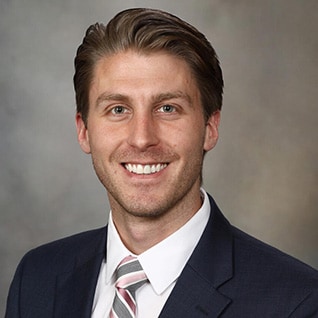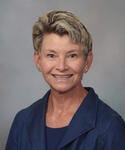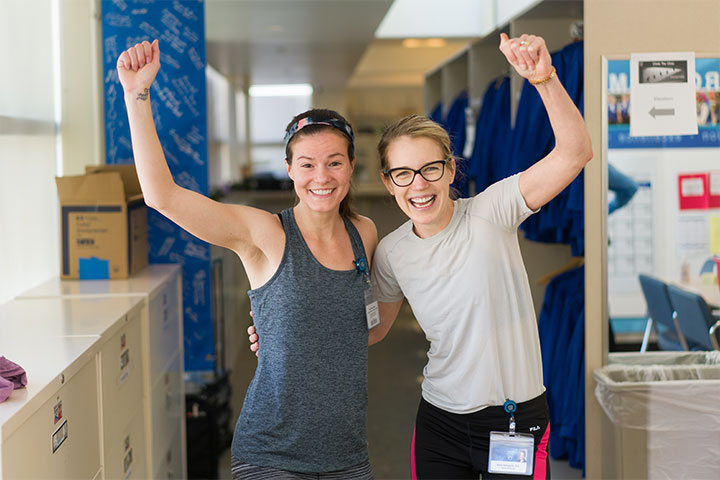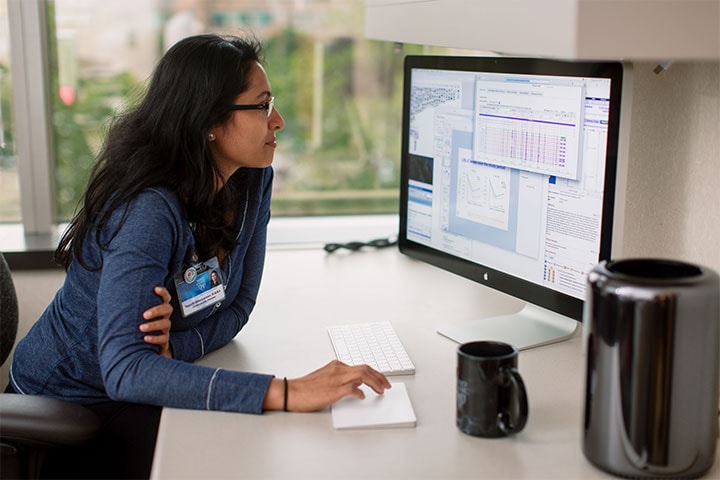Overview
The Pediatric and Congenital Interventional Cardiology Fellowship at Mayo Clinic in Rochester, Minnesota, provides exceptional preparation for you to meet the complex interventional needs of patients with congenital heart disease. Immersed in a multidisciplinary, patient-centered environment, you will gain hands-on experience in advanced interventional techniques while collaborating closely with experts across various specialties. This holistic approach ensures well-rounded training in both clinical care and teamwork.
A key feature of the program is the opportunity to treat patients across the full spectrum of life, from fetal and neonatal interventions to transcatheter valve replacements in elderly patients. You also have the flexibility to tailor your experience, with dedicated training experiences in the areas of mechanical circulatory support and adult congenital heart disease. While specific global health opportunities are not available, you will benefit from Mayo Clinic's vast resources and research collaborations with leading cardiology experts around the world.
Research is integral to the fellowship, with dedicated time for scholarly activities. You will have access to cutting-edge facilities, mentorship from experienced faculty, and opportunities to present your work at national and international conferences, ensuring a well-balanced academic, and clinical experience.
faculty-to-trainee ratio to ensure personalized mentorship and extensive one-on-one training
fellow accepted per year allowing for focused and individualized learning experiences
conferences fellows attend annually for professional development and networking opportunities
Application process
Positions
One position is available on an annual basis.
Our program is highly competitive, and applicants are encouraged to submit a comprehensive application highlighting clinical experience and research accomplishments. Strong letters of recommendation are key to standing out in the application process.
Qualifications
Applicants for the Pediatric and Congenital Interventional Cardiology Fellowship program must have completed an Accreditation Council for Graduate Medical Education (ACGME) program and be:
- Board-certified in Pediatrics through the American Board of Pediatrics and board-certified/eligible in Pediatric Cardiology, or
- Board-certified/eligible in Adult Congenital Heart Disease through the American Board of Internal Medicine, or
- Board-certified/eligible in Interventional Cardiology through the American Board of Internal Medicine
Also see general admissions requirements.
How to apply
The application and all supporting documentation must be submitted by Oct. 1 of the year preceding the program start date. The academic year begins in July.
Create an account to begin the online Application for Admission.
All applications to Mayo Clinic School of Graduate Medical Education programs must include these application materials.
After submission, view the required Supplemental Items and Documents.
- Upload each required item in the Supplemental Items section
- Complete the Recommendation Request section
Applicants considered for an appointment will be invited to interview with the program director and selected faculty.
Interviews are conducted between receiving the application through March.
Program history
Program history
The Pediatric and Congenital Interventional Cardiology Fellowship program in Rochester, Minnesota, began training its first fellow in 2025. Since its inception, the program has been committed to providing cutting-edge interventional cardiology training to address the growing need for specialized care in congenital heart disease patients.
Curriculum
Clinical training
The curriculum offers comprehensive training in all aspects of pediatric and congenital cardiology, covering preoperative assessment and planning, intraoperative management, and postoperative care.
You will gain extensive hands-on experience in both pediatric and adult congenital heart disease interventions, including procedures such as ASD and VSD closures, transcatheter valve replacements, and advanced stenting techniques.
Graduated autonomy is a key component of the program, ensuring that by the time you complete your training, you are fully prepared for independent practice as interventional cardiologists.
Rotation schedule, rotation descriptions
Rotation schedule
| Rotation | Length |
|---|---|
| Cardiac Interventional Rotation | 12 months |
Rotation descriptions
Ultrasound-Guided Vascular Access: Fellows gain expertise in obtaining vascular access using ultrasound for various interventional procedures.
Right and Left Heart Catheterizations: Fellows perform diagnostic and therapeutic catheterizations for assessing hemodynamics and managing congenital heart defects.
Intracardiac Echocardiography: Fellows learn to use intracardiac ultrasound during interventions to visualize cardiac structures and for procedural guidance in real time.
Neonatal Catheterization: Fellows participate in catheter-based interventions on neonates with congenital heart defects.
Patent Ductus Arteriosus (PDA) Device Closure: Fellows perform device closure of the PDA in infants and children.
Atrial Septal Defect (ASD) and Ventricular Septal Defect (VSD) Closures: Fellows gain hands-on experience in closing septal defects using transcatheter techniques.
Transcatheter Valve Replacements: Fellows perform valve replacement procedures, including pulmonary and tricuspid valve interventions.
Endovascular Fontan Pathway Revision: Fellows perform stenting or angioplasty on Fontan pathways to manage complications in patients with single ventricle physiology.
Pulmonary Artery Interventions: Fellows perform stenting or angioplasty of the pulmonary arteries in patients with congenital heart disease.
Mechanical Circulatory Support Initiation: Fellows participate in the initiation of mechanical support systems, such as ECMO, for critically ill cardiac patients.
Collateral Vessel Embolization: Fellows perform embolization of collateral vessels using coils or devices to manage abnormal vascular structures.
Patent Ductus Arteriosus (PDA) Stent Implantation: Fellows learn the technique of stent implantation to maintain ductal patency in patients with duct-dependent circulation.
Didactic training
A typical day
A typical day begins with a morning huddle at 7:45 a.m., where the staff reviews the day’s procedures and workflow, ensuring alignment and preparation across the team. Following this briefing, you will participate in performing two to three interventional cases in sequence, working closely with the same dedicated team throughout the day to maintain continuity and focus.
Between cases, you will evaluate patients in the PACU, assessing recovery and determining readiness for discharge. Patients who meet discharge criteria are released home, while those requiring admission are closely monitored by the fellow, who will also conduct morning rounds on admitted patients before the next day’s huddle.
The structured day typically concludes around 5 p.m., allowing you a balanced schedule while providing comprehensive patient care and procedural training.
Call schedule during on-service rotations
In the current era, emergent cases have become rare due to advancements such as prostaglandin therapy. As a result, there is no formal on-call schedule for fellows. However, when an opportunity for an emergent after-hours case arises, you will be contacted and offered the option to participate in the procedure if you are available. This flexible approach allows you to gain experience in urgent cases without the burden of a formal call schedule.
How didactics are conducted
The Pediatric and Congenital Interventional Cardiology Fellowship emphasizes experiential, hands-on learning as the primary mode of education. While you are encouraged to attend any formal didactic sessions available through the Pediatric Cardiology Fellowship, there is no requirement to attend a set number of lectures. At this advanced stage of training, the program fosters a self-directed learning approach, allowing you to delve deeply into topics driven by their clinical experiences and patient encounters. This structure supports your growth and development as an independent interventional cardiologist who continuously learns from each case you encounter.
Procedures, facilities and locations, call frequency, moonlighting
Procedures
A total case volume of 300 cases as primary operator is the current targeted procedural volume. You may achieve higher volumes, but it varies based on case complexity. Cases will also span the spectrum of age, from newborns to elderly patients.
You will demonstrate expertise and proficiency in a range of specialized procedures, including ultrasound-guided vascular access, right and retrograde left heart catheterization, and intracardiac echocardiography. You will gain hands-on experience with complex interventions such as neonatal catheterization, device closures for patent ductus arteriosus, atrial and ventricular septal defects, and transcatheter valve replacements for tricuspid and pulmonary valves. Additional skills include endovascular Fontan revisions, pulmonary artery stenting/angioplasty, and mechanical circulatory support initiation. Performance is assessed through direct observation, case log reviews, and patient outcome evaluations.
Facilities and locations
You will be located within the cardiac catheterization laboratory at Mayo Clinic. All necessary resources are provided for the fellow. Access to the Dan Abraham Healthy Living Center is available to all Mayo Clinic staff.
Call frequency
Clinical and educational work hours must be limited to 80 hours per week, averaged over a four-week period, inclusive of all in-house clinical and educational activities, required clinical work done from home, call activities, and all moonlighting.
Moonlighting
Moonlighting is permitted. The Moonlighting Policy is standard under MSGME providing guidelines and procedures governing work hours for Pediatric and Congenital Interventional Cardiology Fellows. This document is available upon request.
Conferences, research opportunities
Conferences
- Teaching and Quality Improvement Conferences: Held weekly, you are expected to actively participate in teaching and quality improvement conferences, contributing to the academic environment through the sharing of knowledge and the discussion of clinical cases. These conferences provide a platform for fellows to engage in critical discussions that enhance patient care and procedural outcomes.
- Surgical Case Conference: Held weekly, the surgical case conference is a key component of the fellowship. You are responsible for reviewing and presenting catheterization data during these sessions, demonstrating their ability to analyze complex cases and contribute to the surgical planning process.
- Visiting Professor Conferences: The Division of Pediatric Cardiology hosts visiting professor conferences. You are expected to attend these sessions, which offer unique opportunities to learn from distinguished experts in the field and to engage in discussions on the latest advancements in pediatric cardiology.
Research opportunities
You are paired with the program director to establish goal-directed research projects at the onset of the program. You are expected to contribute to advancing the field through completion of peer-reviewed publications and presentations at national and international conferences. A cornerstone of the program is fostering innovation, including advancements in procedural techniques and device development. Research opportunities are abundant, and specific projects are selected in collaboration with the mentor to align with your interests and career goals.
You are expected to participate as instructors in mechanical support training, which occurs on average once per quarter. This training is crucial for developing the skills necessary to manage complex cases that require mechanical circulatory support, ensuring that you are prepared to handle the full spectrum of interventional cardiology procedures while training colleagues to improve and standardize the care process.
By engaging in these activities, you not only enhance your clinical and procedural expertise but also develop as educators, researchers, and leaders in the field of pediatric and congenital interventional cardiology.
Teaching opportunities, evaluation, mentorship
Teaching opportunities
As you advance in your training, you are expected to take on supervisory roles, overseeing the work of more junior residents, medical students, and possibly other fellows. This includes guiding less experienced trainees in patient evaluations, procedural planning, and during the execution of interventional procedures. You will provide feedback and mentorship, ensuring that the junior team members are developing their skills in a safe and educational environment.
The program cultivates physician scholars who are not only capable of delivering exceptional patient care but also dedicated to educating the next generation of interventional cardiologists. Graduates are prepared to confidently step into educational roles as new staff members, equipped to mentor and teach future trainees effectively.
Evaluation
Performance is assessed through direct observation, case log reviews, and patient outcome evaluations. You will meet with the program director on a quarterly basis to review cumulative evaluations and receive feedback. These regular meetings are designed to support your progress, address any areas for improvement, and optimize your success in the program.
Mentorship
In the Pediatric and Congenital Interventional Cardiology Fellowship, you can expect a close, mentorship-driven experience with the fellowship director as your primary mentor. Working side by side, the fellowship director provides real-time feedback, personalized guidance, and opportunities for hands-on learning. The mentor actively introduces you to leaders in the field, fosters research opportunities, and encourages innovative thinking in procedural techniques and device development. This mentorship approach is designed to support both clinical and academic growth, preparing you for leadership roles in interventional cardiology.
Belonging
At Mayo Clinic, we foster an inclusive working environment and embrace the diversity of all our trainees, faculty, staff, and patients. Our Office of Belonging offers tremendous resources to support our mission of maintaining a welcoming atmosphere for all our employees, including our learners. We strive to provide culturally appropriate care and do our part to reduce healthcare disparities.
/0x0:512x512/prod01/channel_2/media/studio-sites/mccms-reference-guide/512X5121573348_3801872_0024-(1).jpg)
Video: See yourself at Mayo Clinic
5:33
From the program director
 Welcome to the Pediatric and Congenital Interventional Cardiology Fellowship at Mayo Clinic!
Welcome to the Pediatric and Congenital Interventional Cardiology Fellowship at Mayo Clinic!
It is a privilege to serve in this remarkable field, caring for patients with congenital heart disease throughout their entire lives—from infancy to senior years—a continuum of care that is truly unique to our specialty.
As program director, I have the honor of working closely with fellows each day, guiding them through an in-depth, hands-on experience that not only develops their clinical skills but also fosters their growth as educators and innovators. Our program places a strong emphasis on experiential learning and mentorship, ensuring you reach your highest potential in both patient care and academic pursuits.
Our fellowship’s foundation is innovation. From advancing procedural techniques to developing devices, we cultivate an environment that encourages creative thinking and impactful research. You will have abundant opportunities to contribute to the field through peer-reviewed publications and presentations at national and international conferences. Our mission is to prepare you to step confidently into their roles as interventional cardiologists, ready to educate and inspire the next generation of specialists in this field.
One of the greatest rewards of my career is witnessing the achievements of those I’ve had the honor to train—seeing them reach new benchmarks and milestones once thought insurmountable. There is no greater satisfaction than watching former fellows make profound impacts on the field and improve the lives of patients worldwide.
I hope you consider our fellowship for the next stage of your training. It would be our honor to support you on this exciting and meaningful journey in Pediatric and Congenital Interventional Cardiology.
Jason Anderson, M.D.
Pediatric and Congenital Interventional Cardiology Fellowship Program Director
Department and faculty
The cornerstone of a great program is indeed the people who comprise it. Here at Mayo Clinic, we are fortunate to have a dedicated team of three Pediatric and Congenital Interventional Cardiologists.
This collaborative group brings together diverse strengths and expertise, allowing each individual to contribute uniquely to the success of the program and the exceptional care of every patient who enters our catheterization laboratory. Together, we create a supportive, dynamic environment that advances patient outcomes and fosters the growth of future leaders in our field.
Core faculty
 |
Allison Cabalka, M.D.Director, Congenital Cardiac Catheterization Lab
|
 |
Nathaniel Taggart, M.D.Fellowship Director, Pediatric Cardiology
|
Wellness initiatives
As a trainee, your physical and mental health are priorities to Mayo Clinic and the department. Trainees have access to several resources to promote well-being, as well as time off clinical duties to attend appointments.
- Dan Abraham Healthy Living Center
- Groups on campus
- Well-being
Dan Abraham Healthy Living Center
 Trainees have access to the Dan Abraham Healthy Living Center (DAHLC), which is located on both Mayo Clinic campuses (downtown and Saint Marys) in Rochester, Minnesota. This state-of-the-art fitness facility offers basic classes (including free weights, stretching, cardio, and more), drop-in classes, evaluation services, group training, virtual personal training, and virtual wellness coaching.
Trainees have access to the Dan Abraham Healthy Living Center (DAHLC), which is located on both Mayo Clinic campuses (downtown and Saint Marys) in Rochester, Minnesota. This state-of-the-art fitness facility offers basic classes (including free weights, stretching, cardio, and more), drop-in classes, evaluation services, group training, virtual personal training, and virtual wellness coaching.
Membership to the DAHLC is available at a low cost to trainees and their families through payroll deduction.
Video: Dan Abraham Health Living Center
Video: A look inside the Dan Abraham Health Living Center
Groups on campus
 Several groups on campus help you connect with other fellows and their families, such as the Mayo Fellows Association, the Mayo Families' Connection, and Mayo Employee Resource Groups. These groups help enhance your training by providing and organizing wellness initiatives and social activities.
Several groups on campus help you connect with other fellows and their families, such as the Mayo Fellows Association, the Mayo Families' Connection, and Mayo Employee Resource Groups. These groups help enhance your training by providing and organizing wellness initiatives and social activities.
Workshops for spouses and significant others are also available.
Well-being
 The Office of Academic Support and Well-Being provides resources to promote academic, emotional, social, cognitive, financial, and physical well-being. Career and academic services include academic advising, peer tutoring, and accommodations for learners with disabilities or health conditions. Mental health services, counseling, interview practice, and a variety of enrichment sessions on topics like budgeting, resiliency, and stress and burn-out are also available through the Academic Support and Well-Being office.
The Office of Academic Support and Well-Being provides resources to promote academic, emotional, social, cognitive, financial, and physical well-being. Career and academic services include academic advising, peer tutoring, and accommodations for learners with disabilities or health conditions. Mental health services, counseling, interview practice, and a variety of enrichment sessions on topics like budgeting, resiliency, and stress and burn-out are also available through the Academic Support and Well-Being office.
More from Mayo Clinic School of Graduate Medical Education
/0x0:512x512/prod01/channel_2/media/mccms/content-assets/academics/residencies-and-fellowships/3319834_0363-512X512.jpg)
Choosing Mayo Clinic
/0x0:512x512/prod01/channel_2/media/mccms/content-assets/shared-documents/campus-MEYR6203-pic-tile.jpg)
Rochester, MN
Campus and community
/0x0:512x512/prod01/channel_2/media/studio-sites/mccms-reference-guide/512X5121676671_3824027_0010_C.jpg)
Stipend and benefits
Mayo Fellows Association (MFA)
The Mayo Fellows Association (MFA) offers a peer and social support network for residents and fellows and their families with social events, athletics, and advocacy. The MFA also holds an annual resident and fellow appreciation event open to all trainees with complimentary massages, stress-reducing activities, and social support.
/953x0:4766x3813/prod01/channel_2/media/mccms/content-assets/academics/residencies-and-fellowships/pediatric-and-congenital-intervent-car-fell-mn/ped-and-congen-intervent-cardiol-fell-mn-image-1.jpg)